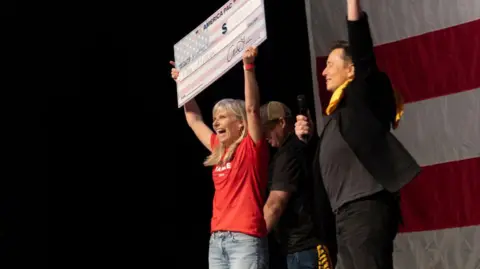

Zander Mundy was midway through a typical day at his office when he heard the news: tech billionaire Elon Musk was speaking at a nearby school in the town of Folsom, in the US state of Pennsylvania.
“When is the richest guy in the world in town often?” Mr Mundy remembers thinking to himself.
With a population of just under 9,000 people, Folsom is a quiet place. Residents typically shy away from speaking openly about their politics, and political yard signs are few and far between.
The 21-year-old Mr Mundy, who works at a leasing agent at an apartment complex, admits that he wasn’t planning on voting in the November election.
But once he saw crowds forming – and felt the excitement – he decided to go in, eager to hear from Musk.
By the time he left the school, he recalls leaning more towards Donald Trump than towards Kamala Harris.
“[If] someone like that tells you this is the election that’s going to decide our future, not only who’s president for the next four years but what the world world is going to be like… I think that’s pretty huge,” he told the BBC. “That matters. That’s significant.”
Musk, who previously cultivated an image as an eccentric tech genius who was only on the sidelines of politics, has now pledged full allegiance to Trump.
In full view of the American public, the 53-year-old has invested his time, operational know-how and ample pocketbook into trying to get the Republican elected – a rarity among the nation’s business elite who traditionally prefer to influence politics from behind the scenes.
It’s an approach that is starkly different to traditional CEOs, many of whom have been better known for holding expensive, exclusive fundraising dinners or hosting potential donors at lavish homes in the Hamptons.
And it’s prompted observers to ask questions about Mr Musk’s motivations.
The traditional approach by CEOs is “not out in the public spotlight,” explains Erik Gordon, chair of the entrepreneurship department at the University of Michigan’s Ross School of Business. But “Musk does it loudly and proudly, and, therefore, perhaps makes himself a lightning rod”.
Musk’s Trump-supporting political action committee – America PAC – has already spent more than $119m (£91.6m) this election cycle, according to Open Secrets, a non-profit tracker.
Additionally, Musk’s own contributions make him one of the largest individual donors in the presidential race, and reportedly play a vital role in Trump’s door-knocking and ground operation in key swing states in which the campaign hopes to mobilise voters.
Steve Davis, a key lieutenant of Musk’s who has worked for his companies including SpaceX, X and the Boring Company, has reportedly been recruited to help in the effort.
 Getty Images
Getty ImagesMr Musk’s personal investment into the campaign is something that was quickly noticed by Mr Mundy.
“That alone was shocking to me,” he said. “That someone would really spend that much time and money to influence voters. That means he’s doing it for a reason.”
Some Democrats, like Pennsylvania Senator John Fetterman, have been urging their party to not ignore the threat Mr Musk poses ahead of the election.
Mr Musk appeals to a demographic of people who see him as “undeniably brilliant” and among whom traditional Democratic outreach efforts have proven difficult, Fetterman believes.
Since first endorsing Trump in the wake of the assassination attempt in Butler, Pennsylvania, on 13 July, Mr Musk has become a common fixture on the campaign trail, where he often delivers warnings that only Trump can “save” American democracy.
In the closing days of the race, Mr Musk has criss-crossed the state of Pennsylvania, a key battleground state that has become a focus for Trump and Kamala Harris alike.
America PAC is now doling out $1m a day until election day to one random voter – no matter their party affiliation – provided they have registered to vote and sign a petition.
At “town hall” events in Harrisburg and Pittsburgh over the weekend, for example, Mr Musk presented giant lottery-style cheques to winners, with enthusiastic crowds chanting “Elon”. He responded by telling the crowd that their energy “lights a fire” in his soul.
At a rally in Philadelphia on Monday, Congresswoman Alexandria Ocasio-Cortez said Mr Musk was “dangling a million bucks to many of us who are struggling to make ends meet, if they dance for him”.
“Elon Musk thinks that dangling money in front of a working person is a cute thing to do when the election of our lives is before us because that’s what people and billionaires like that do,” she added.
Some observers, however, have questioned his motivation and have suggested that Mr Musk and his businesses stand to benefit from a relationship with Trump.
Among those observers is Matt Teske, the CEO of electric vehicle charging platform Chargeway.
According to Mr Teske, Mr Musk’s political shift has been difficult for many in the electric vehicle industry, but comes as no surprise after several years of becoming increasingly active in politics.
“I think Musk’s interests are focused, predominantly, around a handful of things that are important to him related to his businesses, [with] regulation being something he’s voiced concerns around,” Mr Teske says. He notes that Mr Musk “pushed back heavily” on restrictions implemented during the Covid-19 pandemic in California.
 Getty Images
Getty ImagesThe University of Michigan’s Professor Gordon agrees. He says Mr Musk sees himself as a someone who has been held back by regulators, and feels that government intervention has stifled the development of the technologies he is focused on, such as autonomous driving.
“He wants to be sort of on the frontier, [a] wild and woolly entrepreneur who can break new paths and not be bogged down by regulation, which tends to fall five, 10, 20 years behind advances in technology,” Prof Gordon says.
“Musk wants to go the other way,” he adds. “He wants to go to Mars.”
If he wins in November, Donald Trump has suggested that Mr Musk could oversee “cost cutting” in the US government. Even if he doesn’t do that exact job, Mr Musk would have Trump’s ear thanks to his support during the campaign, observers believe, and he could have a strong influence on the administration’s decision-making.
Mr Musk, for his part, has said he would be open to the idea of leading a “department of government efficiency” to end regulation’s “strangulation” of the US.
That position, Democrats say, could present a complex conflict of interest, given the billions in government contracts Mr Musk has received for SpaceX and Tesla.
“That’s kind of deeply both unethical and illegal,” says Lenny Mendonca, California Governor Gavin Newsom’s former chief economic and business adviser.
Mendonca believes that those with intertwined government and regulatory relationships “can have a voice” but should not be in a position of authority over those same interests.
Lawrence Noble, a former general counsel at the Federal Election Commission, has questioned the legality of Mr Musk’s giveaways in the election cycle.
Mr Noble believes that this form of campaigning should concern Americans who value safe work environments and consumer protections.
“We know what companies do when left to their own devices. They put profit and stockholder value and CEO compensation above safety, and they kind of write off the safety issues as a cost of doing business,” he tells the BBC.
“It’s dangerous to have somebody who views business that way, and views government that way, in charge of safety,” he adds.
For Mr Musk – who relishes being a “disrupter” and renegade – there’s little question that his lucrative relationships with the US government will continue, no matter the result of the November election.
But his brand, and his reputation, are now tied to Donald Trump’s – and his actions suggest he knows it.
Additional reporting by Pratiksha Ghildial
North America correspondent Anthony Zurcher makes sense of the race for the White House in his twice weekly US Election Unspun newsletter. Readers in the UK can sign up here. Those outside the UK can sign up here.